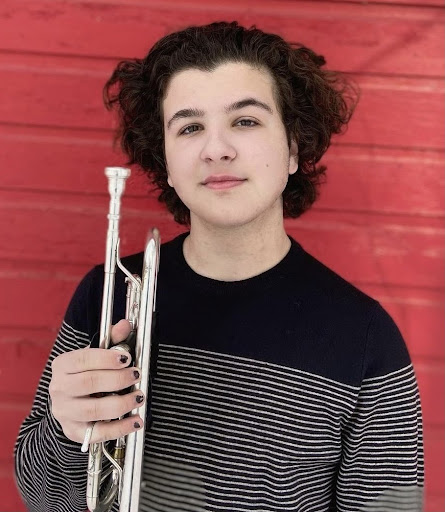by Mike Telin

On Sunday, February 20 at 3:00 pm at Severance Music Center, Beta will perform Alexander Arutunian’s Trumpet Concerto with the Cleveland Orchestra Youth Orchestra. Under the direction of Vinay Parameswaran, the program will also include Jennifer Higdon’s Blue Cathedral and Manuel de Falla’s Suites No. 1 & 2 from El Sombrero de Tres Picos (Three-Cornered Hat). Tickets are available online.
2021 was a good year for the Rocky River High School senior. In addition to winning the COYO concerto competition, Beta was also the First Prize winner of the High School Division of the World Trumpet Society’s Daniel Patrylak Memorial Orchestral Competition as well as a member of the National Youth Orchestra of the United States.
Because of concerns about the safety of the Cleveland Orchestra Youth Chorus (COYC) gathering and rehearsing amid the steady increase of COVID-19 cases, the original program was revised and Beta’s appearance was moved up by three months.
How did he react when he got the call informing him that his debut concerto performance would happen in a little over three weeks? “At first it was very intimidating, because for every senior going into music, it’s the middle of college audition season,” the 17-year-old said. “The first thing that made it a little more comforting is the trust that I have in Mr. Parameswaran after so many years in COYO — I feel like if he believes that I can do this, then it will be okay.”
That trust between conductor and player can be traced back to Beta’s first seating audition. “It was for Sibelius 2, and I played with two broken arms,” he recalled. “He still assigned me to play principal. So even with the program change, since we’re doing this together, with an orchestra that I’m very comfortable with, I think it will be all right.”
Beta said the second thing adding to his comfort level is that the concerto is “literally in my blood.” Like Alexander Arutunian, he is Eastern European. “My parents came from Albania in 2001. I think that a big reason why this is my favorite and go-to concerto is because the character of the piece is so instinctive. It just goes with who I am as a person.”
Written in 1950, the concerto is highlighted by Eastern European lyricism and harmonic textures common in the composer’s music. It is written as a single-movement work consisting of seven sections that are performed without pause.
Unlike the long orchestral introductions of Classical-Era concertos, the Arutunian makes a statement from the very beginning. “There’s no waiting for the trumpet to come in — right off the bat you’re into the piece.” And with a duration of 16-17 minutes, endurance is a consideration. “You can’t play big, loud, and strong all the way through. With the long cadenza and flashy ending, it is a challenge. But I enjoy the freedom that I have to explore new colors and expressions in my playing.”
Beta said that the opportunity to stand in front of the orchestra is an amazing experience. “Getting to play chamber music with my talented string colleagues right there is incredible.” It has also given him a new appreciation for the roles of the concertmaster and string section principals. “When you’re in the back, of course you listen to the entire orchestra. But being up there and hearing the concertmaster, Moshi Tang — he and the other string principals sound amazing. And listening to the way that the sections listen to each other has helped me to rethink the way that I listen to the rest of the brass and woodwind sections.”
The trumpeter said that compared to being part of the orchestra, playing the concerto gives him a little more freedom to say what he wants to say. “You listen to the recordings and there is a massive range of interpretations, so I’ve enjoyed the new aspect of music-making that this opportunity has provided me as a developing player.”
Winding down our conversation, I asked if he had a special shout-out he’d like to give anyone. Without hesitation, he said that he attributes his success to his parents. “They are so supportive, especially in a career path that they are not familiar with — I’m not from a musical family. From the beginning they have been my number-one supporters. My high school band director Michael Komperda has also been an important part of my support system, as has my trumpet teacher Richard Pokrywka.”
Beta said that he also owes a lot to the Cleveland Orchestra trumpet section. “I think the reason I sound and play the way that I do is because of growing up in Cleveland — getting to play with them in coachings, having lessons with them. I think going to Orchestra concerts every week and getting to hear them is the number one thing that has contributed to my concept of sound.”
Published on ClevelandClassical.com February 15, 2022.
Click here for a printable copy of this article


